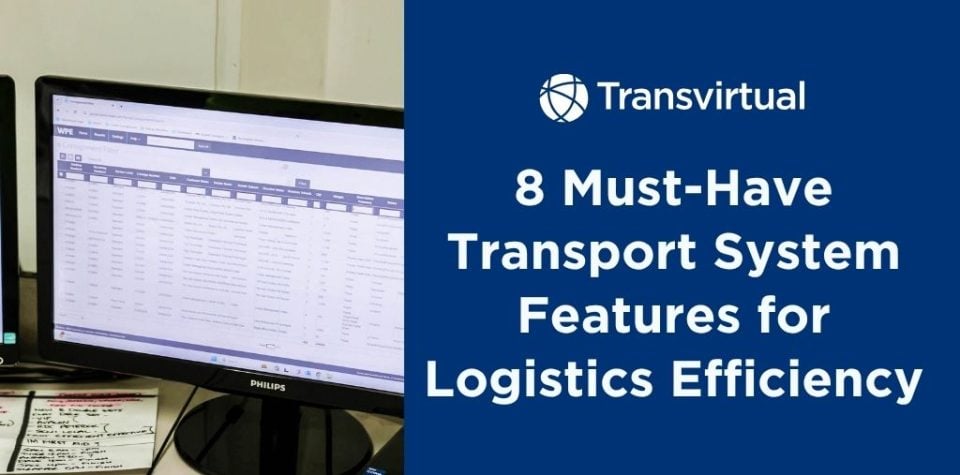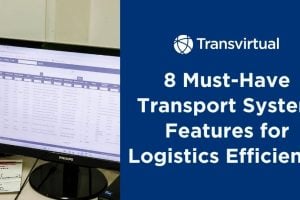Table of Contents
Logistics has become so fast-paced that without efficient transportation management, your company can scarcely be competitive. Our supply chains are more complex than ever, and so are customer expectations.
That’s what makes selecting the right transportation management system (TMS) so critical. It can unlock a wealth of opportunities by streamlining your operations, optimising your supply chain visibility, boosting profits, and reducing transportation costs.
8 Features to Look for in a Modern Transportation Management System
1. Route Optimisation: The Core of Efficient Transportation Planning
Successful transportation operations depend on efficient transportation planning. Route optimisation enables businesses to plan and execute cost-effective and time-efficient routes for their fleets.
Your TMS software should leverage machine learning and real-time data to determine the most efficient routes, helping you reduce fuel costs, improve delivery performance, and enhance customer satisfaction.
2. Automated Load Planning and Job Assignments for Smarter Transport Operations
Manual load planning and job assignments are time-consuming and prone to errors. A modern transportation management system automates these tasks using advanced analytics and data-driven decisions to optimise asset utilisation and lower operational costs across your entire transportation process.
3. Analytics and Reporting: Turning Transport Data into Strategic Decisions
A powerful transport management system offers advanced analytics and reporting tools that convert real-time data and historical data into actionable insights.
By monitoring key performance indicators like on-time delivery rates, fuel consumption, and asset utilisation, logistics managers can identify bottlenecks, improve logistics performance, and make informed business decisions.
4. Integration Capabilities to Strengthen Supply Chain Operations
A connected transportation management system should integrate seamlessly with your existing systems, including warehouse management systems, enterprise resource planning tools, and order management platforms.
These integration capabilities help logistics teams eliminate data silos, improve collaboration, and increase overall supply chain efficiency.
5. Mobile-Ready Functions: Real-Time Tracking, ePOD, and Barcodes
Mobile-ready features like barcode scanning, electronic Proof of Delivery (ePOD), and real-time tracking keep your operation running smoothly.
With ePOD, drivers can record deliveries instantly with signatures, photos, and timestamps. It removes paperwork, prevents delivery disputes, and speeds up invoicing by confirming jobs on the spot.
A flexible TMS with cloud-based access keeps customers updated, improves delivery performance, and helps your team respond quickly to any changes.
6. Carrier Management for Stronger Freight Relationships
Carrier management is key to reducing transportation costs and improving freight management.
A comprehensive TMS system allows logistics providers to track carrier performance, manage contracts, and ensure compliance while maintaining stronger carrier relationships that lead to significant cost savings and higher customer satisfaction.
7. Fleet Management for Lower Operational and Freight Costs
An integrated TMS with fleet management capabilities enables transport operators to track vehicles, manage fuel consumption, and optimise maintenance schedules.
By improving utilisation and reducing freight costs, logistics teams can achieve substantial operational efficiency and improve supply chain reliability.
8. Automated Billing and Invoicing for Streamlined Freight Billing
Accurate freight billing is essential for maintaining cash flow and customer trust. A transportation management software with automated billing and invoicing helps reduce administrative overhead, improve cost analysis, and deliver timely delivery confirmations.
By integrating billing with other management systems, businesses can reduce errors, speed up payments, and enhance overall business operations.
Transvirtual: The Right Transportation Management System for Your Business
At Transvirtual, we understand the complexities of the transportation industry and the challenges your business faces in managing logistics operations. Our TMS is designed to address these challenges head-on, offering all the must-have features outlined above.
Don’t settle for subpar transportation management systems. Schedule a strategy call with the Transvirtual team today to learn more and take the first step toward simplifying and enhancing your business.


